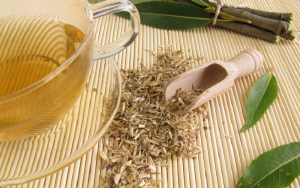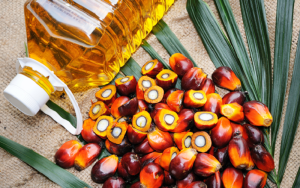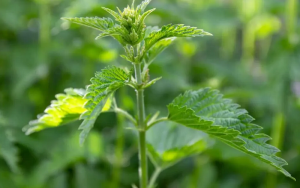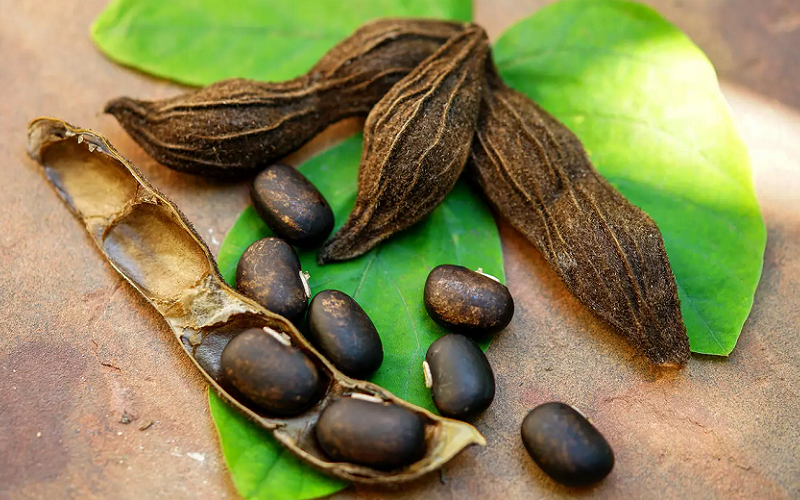
Mucuna Pruriens is a fascinating plant-based solution with the potential to significantly improve mood. Mucuna Pruriens, also known as the velvet bean, is a tropical legume with a long history of traditional use. But this isn’t just about tradition; modern science supports its benefits, particularly in the area of mood enhancement.
Contents
Introduction to Mucuna Pruriens
In our pursuit of wellness and balance, we sometimes overlook the natural remedies that the earth has generously provided. One such gift is Mucuna Pruriens, a plant that has been a significant part of traditional medicine and is now gaining attention in the world of modern science.
Brief Overview of Mucuna Pruriens
Mucuna Pruriens, also commonly known as velvet bean, is a tropical legume native to Africa and tropical Asia, but it’s also grown in various other parts of the world due to its numerous benefits. The plant is climbing in nature and produces clusters of beautiful purple flowers. It is the seeds of this plant that have garnered interest, housing a multitude of bioactive compounds with several health benefits.
Common Names and Origin of Mucuna Pruriens
Apart from being called velvet bean, Mucuna Pruriens has an array of other names. In English, it’s known as Bengal velvet bean, Florida velvet bean, Mauritius velvet bean, Yokohama velvet bean, cowage, cowitch, lacuna bean, and Lyon bean. The plant has a long history in Ayurveda, the traditional Indian system of medicine, where it’s known as Kapikachhu or Atmagupta.
Mucuna Pruriens is believed to have originated from Southern China and Eastern India. However, it has been widely cultivated in various parts of the world, including Africa, America, and the Caribbean, due to its therapeutic potential.
General Uses of Mucuna Pruriens
Traditionally, Mucuna Pruriens has been used for a variety of purposes, such as treating snake bites and improving sexual health. However, one of the primary reasons for its popularity is its potential effect on mood enhancement, which has been supported by modern scientific studies. This plant has been used by traditional healers for centuries to calm the mind, ease tension, and promote a sense of well-being.

Mucuna Pruriens and Its Composition
The potency of Mucuna Pruriens can be attributed to its rich and varied composition of bioactive components. In this section, we’ll examine the specific components that contribute to the mood-enhancing capabilities of this extraordinary plant.
Active Components in Mucuna Pruriens
The power of Mucuna Pruriens comes from its diverse array of bioactive compounds. Understanding these components is key to grasping why this plant is so effective for improving mood.
L-Dopa
The primary component of Mucuna Pruriens is L-Dopa (Levodopa), a naturally occurring amino acid that transforms into dopamine in your body. Dopamine is a neurotransmitter that plays a crucial role in mood, pleasure, and reward, making L-Dopa an integral part of the plant’s mood-enhancing properties [1].
Other Bioactive Compounds
While L-Dopa is a significant component, Mucuna Pruriens also contains other bioactive compounds that contribute to its overall benefits. These include serotonin, another important neurotransmitter related to mood, and several antioxidant compounds that help protect the body from oxidative stress.
How These Components Interact with the Human Body
Mucuna Pruriens doesn’t just contain a mix of beneficial components; these components interact with our bodies in ways that may have positive effects on our overall mental well-being.
When consumed, L-Dopa is absorbed by the digestive system and crosses the blood-brain barrier, where it is converted into dopamine. This boost in dopamine can lead to enhanced mood and feelings of well-being. The other bioactive compounds in Mucuna Pruriens, including serotonin and antioxidants, also have potential benefits for mood and overall brain health [2].
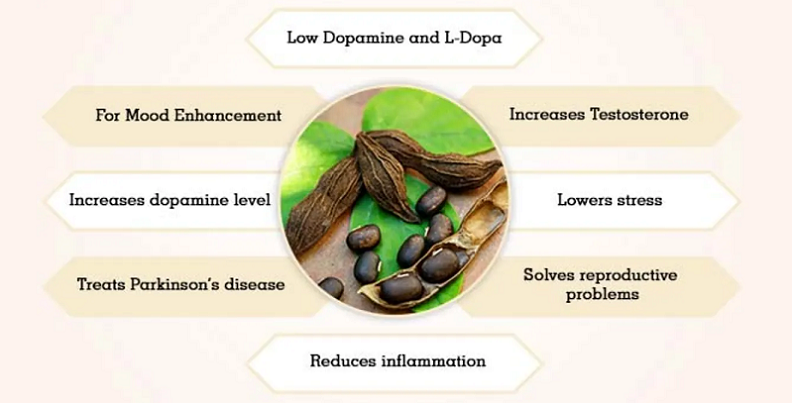
Understanding Mood Disorders and Neurotransmitters
Before we delve deeper into how Mucuna Pruriens can aid in mood improvement, it’s essential to understand mood disorders and the vital role neurotransmitters play in maintaining emotional balance.
Introduction to Mood Disorders
Mood disorders, also known as affective disorders, encompass a range of conditions characterized by disturbances in a person’s mood. This can involve feelings of extreme sadness (as in depression), extreme happiness or mania (as in bipolar disorder), or fluctuations between both extremes. Mood disorders can significantly impact a person’s quality of life, influencing their emotions, thoughts, and everyday activities.
Role of Neurotransmitters in Mood Regulation
Neurotransmitters are chemical messengers that play a pivotal role in how we feel, think, and behave. They transmit signals between nerve cells, influencing a wide range of processes in our bodies, including mood regulation. We’ll now take a look at three key neurotransmitters that are particularly important in this respect [3].
Serotonin
Often referred to as the “feel-good” neurotransmitter, serotonin contributes to well-being and happiness. Low levels of serotonin have been linked to depression and anxiety. Hence, maintaining optimal serotonin levels is crucial for promoting a positive mood.
Dopamine
Dopamine is another significant neurotransmitter when it comes to mood regulation. It’s associated with the pleasure and reward system in the brain, affecting how we perceive and respond to positive experiences. Imbalances in dopamine can result in mood disorders, including depression.
Norepinephrine
Also known as noradrenaline, norepinephrine plays a role in attention and the body’s stress response. While not as directly tied to mood as serotonin and dopamine, imbalances in norepinephrine can contribute to mood disorders, particularly anxiety and depression.
Understanding the role of these neurotransmitters sets the stage for us to explore how Mucuna Pruriens, with its rich composition of L-Dopa and other bioactive compounds, might interact with these neurotransmitters to support mood enhancement.
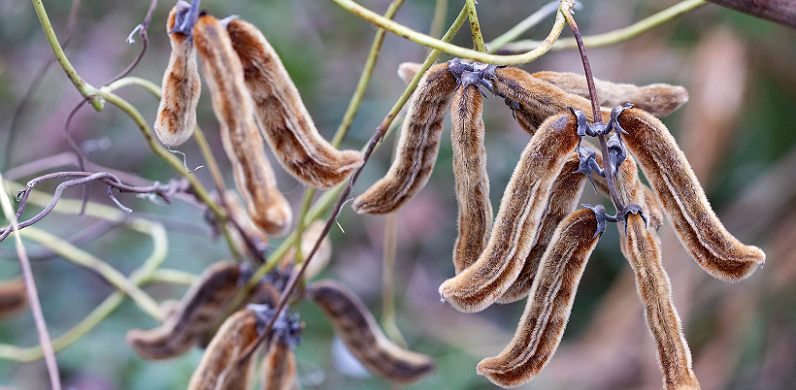
Mucuna Pruriens for Mood Improvement: The Science Behind It
Now that we understand the complex interplay of neurotransmitters in mood regulation, it’s time to explore how Mucuna Pruriens fits into this picture. The rich composition of this plant can positively impact our mood, and scientific studies are starting to back up these claims.
Mucuna Pruriens and Dopamine Production
The primary component of Mucuna Pruriens, L-Dopa, is a direct precursor to dopamine, one of the key neurotransmitters we mentioned earlier. When you consume Mucuna Pruriens, your body metabolizes L-Dopa into dopamine, thereby potentially increasing your brain’s dopamine levels. Given dopamine’s role in the pleasure and reward system, this increase can significantly contribute to mood enhancement [4].
How L-Dopa in Mucuna Pruriens Affects Mood
L-Dopa’s transformation into dopamine in our bodies isn’t the end of the story. Once converted, dopamine acts on our brain’s reward and pleasure centres, influencing our mood and emotions. It promotes feelings of pleasure and satisfaction as part of the reward system. Therefore, an increase in dopamine levels, through the consumption of Mucuna Pruriens, may lead to a more positive mood and an overall sense of well-being [5].
Review of Scientific Studies Supporting Mucuna Pruriens for Mood Enhancement
It’s not just traditional wisdom that supports the use of Mucuna Pruriens for mood enhancement; scientific studies are beginning to confirm its benefits. A 2017 study published in the Journal of Traditional and Complementary Medicine found that Mucuna Pruriens had antidepressant effects in mice, suggesting a potential role in managing mood disorders.
Additionally, a 2010 review published in the Journal of Neurology suggested that Mucuna Pruriens might have advantages over conventional L-Dopa preparations in the long-term management of Parkinson’s disease, a condition characterized by dopamine deficiency [6].
How to Use Mucuna Pruriens for Mood Enhancement
Having explored the science behind Mucuna Pruriens and its potential for improving mood, you may be wondering how to incorporate this plant into your wellness routine. Like any supplement, it’s essential to consider dosage, administration, and the various forms in which it can be consumed.
Suggested Dosage and Administration
While Mucuna Pruriens appears to be safe for most people when used appropriately, it’s crucial to start with a low dosage and gradually increase as necessary. A common starting point is 100-200 mg per day of a Mucuna Pruriens extract standardized to contain 15% L-Dopa.
However, as individual responses can vary, it’s always best to consult a healthcare professional before starting any new supplement, including Mucuna Pruriens. A healthcare provider can provide personalized advice, taking into account your unique health history and current situation.
Different Forms of Mucuna Pruriens
Mucuna Pruriens can be found in several different forms, each with its unique advantages. Choosing the one that best fits your lifestyle can enhance your experience with this supplement.
Powdered Form
Mucuna Pruriens powder is versatile and easily incorporated into various foods and drinks. You can mix it into smoothies, juices, or even sprinkle it over breakfast bowls. It’s an excellent option if you prefer to blend your supplements into your daily meals.
Capsule Form
If convenience is your priority, Mucuna Pruriens also comes in capsule form. It’s easy to take, making it a good option for those with a busy lifestyle. The capsule form also ensures a consistent dose each time.
Incorporating Mucuna Pruriens into Your Routine
How you incorporate Mucuna Pruriens into your routine will depend on the form you choose and your personal preferences. Whether you blend it into your morning smoothie or take a capsule with breakfast, the important thing is consistency. Consistent use over time is key to experiencing the potential mood-enhancing benefits of Mucuna Pruriens.
As with any supplement, it’s crucial to pay attention to how your body responds and to adjust your routine accordingly. Remember, what works best for you might be different from what works for others, so listen to your body and adjust your Mucuna Pruriens intake as necessary.
References
[1] Dopamine mediated antidepressant effect of Mucuna pruriens seeds in various experimental models of depression
[2] I Tried The “Dopamine Bean” Supplement — Here’s What Happened
[3] Mucuna pruriens & Dopamine: New Mood Booster on the Block?
[4] Boost your mood with Mucuna purien
[5] The Truth About Dopamine Supplements for Mood Enhancement
[6] Dopamine Supplements to Boost Your Mood

